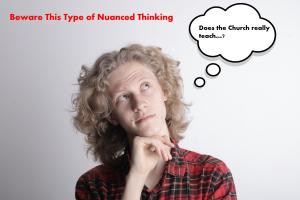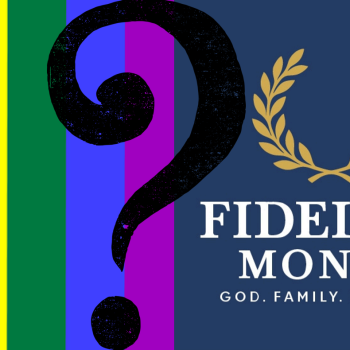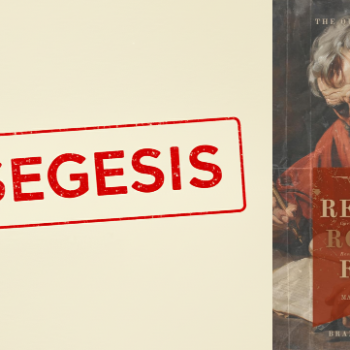During my time writing on Patheos, many of my readers on the more politically and culturally liberal side claim that my writing lacks “nuance” and tends towards binary thinking. They claim that more “mature” and “sophisticated” thinkers comprehend the complexities of morality and theology, especially when one factors in the supremacy of individual conscience. Moreover, they also claim black and white thinking, or thinking that seeks objective truth, shows an unhealthy psychological dependency on certainty, or in the case of immature unnuanced Catholic conservatives, i.e., the Church.
In this article, I address what I consider the main issues with this type of “nuanced” thinking—moral and theological relativism. I show that, contrary to the critique, an appeal to “nuance” in this context does not reflect maturity and sophistication, but an escape into relativism. By taking on a more nuanced approach to morality and theology, the liberal, including Catholic liberals, exist in the gray areas, the foggy fringes. Once securely embedded in the fog, clearly sinful things like abortion and sexual activity outside of marriage no longer appear clear.
50 Shades of Gray Nuance
Now the serpent was more crafty than any other beast of the field that the Lord God had made. He said to the woman,
“Did God actually say…
“You will not surely die. For God knows that when you eat of it your eyes will be opened, and you will be like God, knowing good and evil.” Genesis 3:1-5 [emphasis added]
Not surprising, the first attempt at this type of nuance occurred right before the Fall. The serpent, craftier, dare I say, more sophisticated, of all the beasts of the field, questions the command of God. He implores Eve to look at God’s command in a more nuanced way. Once she does, her eyes will open and she “will be like God, knowing good and evil.” Eve later shares this nuanced approach to God’s command with Adam—and they fall. So much for nuance…
An Appeal to Nuanced Complexity
Another appeal of the sophisticated, mature, and nuanced is complexity. Complexity as it relates to this type of nuance means that issues, sins, and people are so complex that any attempt to pin them down become impossible. For example, sex and gender. While sex may seem binary, in that it appears to take a male and female to reproduce. Gender, on the other hand, is an ever-expanding ball of complexity because people and cultures are likewise complex. That God created humans male and female takes a back seat to a more mature and complex view of human nature.
Furthermore, another casualty of complexity, at least for the nuanced Catholic, is Catholic anthropology. Human nature, as grounded in the image of God, does not adequately reflect complex human nature. Therefore, this simplistic binary must step aside for the new and more nuanced approach to human nature found in gender theory. A theory that accepts the complexity of human nature.
A Nuanced Abortion
No issue separates more people, including Catholics, than the issue of abortion. Words like pro-life/anti-choice and pro-abortion/pro-choice reflect the impact of nuance on this issue. Even within the Catholic hierarchy, we see bishops, like Cardinal Blase Cupich of Chicago, attempt nuance by appealing to the seamless garment argument. He states:
While commerce in the remains of defenseless children is particularly repulsive, we should be no less appalled by the indifference toward the thousands of people who die daily for lack of decent medical care; who are denied rights by a broken immigration system and by racism; who suffer in hunger, joblessness and want; who pay the price of violence in gun-saturated neighborhoods; or who are executed by the state in the name of justice. [emphasis added]
This nuanced equivocation drew the rebuke of another bishop, Archbishop Charles J. Chaput of Philadelphia, who stated in response:
The deliberate killing of innocent life is a uniquely wicked act. No amount of contextualizing or deflecting our attention to other issues can obscure that. [emphasis added]
The archbishop makes the correctly nuanced observation. Children must first survive the womb before needs like food, shelter, adequate immigration policy, and health care take priority. “Humanity’s priority right — the one that undergirds all other rights — is the right to life.”
A Nuanced Conscience
Circling back to abortion. Given the Catholic Church’s view on abortion, how can an organization called Catholics for Choice exist? Simple: a nuanced conscience. A nuanced conscience differs from what the Catechism calls a properly formed conscience. It sees itself as the ultimate authority whether properly formed or not. Jon O’Brien, the president of Catholics for Choice, stated the following in an interview:
Being Catholic is not a litmus test as to whether you adhere to the letter of law in every teaching. Nor does it mean you get up in the morning and do whatever you want to do. It means you properly form a conscience and follow it. You must examine your conscience and that is a serious process of looking at what the church leaders have said, looking at what the Church has written and looking at your impact on others.
Mr. O’Brien gets some of the wording correct, but then applies nuance to the Catholic teaching on a properly formed conscience. For example, the Catechism teaches:
1785 In the formation of conscience, the Word of God is the light for our pat, we must assimilate it in faith and prayer and put it into practice. We must also examine our conscience before the Lord’s Cross. We are assisted by the gifts of the Holy Spirit, aided by the witness or advice of others, and guided by the authoritative teaching of the Church.
Therefore, it is not enough to merely “examine” our conscience to determine if we do not like what the Church and her leaders teach. The method by which we examine our conscience determines its proper formation. The Catechism lists the bible, faith, prayer, the cross, the Holy Spirit, others (with properly formed consciences), all guided by the authoritative teaching of the Church as crucial to developing a properly formed conscience.
Clarity Over Nuance
When it comes to moral issues, basic reasoning oftentimes proves more valuable than nuance, as the former introduces greater clarity into the discussion by exposing good and evil for what they are. The latter obfuscates and confuses, as it blurs the distinctions and degrees separating good from evil, leaving people wondering what’s good and what’s evil. Motley Monk
Moreover, what this type of nuance allows for, especially concerning morality, is moral relativism. With moral relativism, good and evil become foggy and more a matter of personal preference than a standard to live up to. As with the serpent’s encounter with Eve, sin becomes nuanced in the name of “love.” A nuanced love means to welcome all in, regardless of their sin, and leave them wallowing in their sin. “Does the Church actually teach x as sin?” And if so, is not the “pastoral approach,” the loving approach, to “welcome” and “listen,” not judge? Did not Jesus love the sinner? True, Jesus ate with prostitutes and tax collectors. He met people in their lived experiences. Jesus also called these same people to conversion. Jesus came to seek and save the lost (Luke 19:10), not accompany sinners on their way to hell.
We listen to accompany, and in the case of a sinner, to accompany that person to, and through, conversion. If we believe the Scriptures, then we know just how much is at stake. Bishop James Conley of Lincoln, Nebraska
Final Thoughts
In conclusion, this article is not a condemnation of nuanced thinking in general. If one studies the writings of Catholic theologian St. Thomas Aquinas, they find nuance reflected throughout. The principle of Double Effect represents another case of nuance in Catholic moral teaching. So, too the Catholic dogmas of the Trinity, Incarnation, and Atonement also contain a fair share of nuanced thinking. This article calls out an appeal to nuanced thinking that sows confusion and justifies sin, blurs the lines between good and evil, and placing souls at eternal risk.
If you enjoy my writing and want to support my work, please consider donating a monetary gift of any size or quantity by clicking here. Thank you!
















